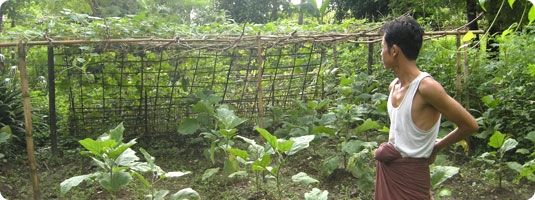Mobilizing Local… Microorganisms?

In Myanmar, scarce and unpredictable rainfall is creating challenges for farmers – a huge problem when most of the country’s residents depend on agriculture for food and income. Between the environmental hardship and rising costs for seeds and fertilizers, fewer and fewer people have been able to maintain their fields. Members of the Men’s Association of the Church of the Province of Myanmar (CPM) put their heads together to tackle the need for a need for a low-cost, environmentally friendly solution. They needed to figure out a way to boost crop production in spite of things like rainfall and supply costs that were beyond their control.
It may sound surprising, but it turned out that the key to creating an environment that would help crops flourish was mobilizing the billions of essential microbes that make up what soil scientists call the rhizosphere. A Japanese technology called Essential Microorganisms (EM) works with the unique mix of bacteria and other tiny organisms in the soil, amplifying the helpful ones that promote plant growth and health. In Myanmar, the Men’s Association is producing EM fertilizer by taking soil from where bamboo trees are growing and mixing it with molasses, rice husks and starter bacteria provided by the Church. According to Program Officer Nagulan Nesiah, who visited the program in May, the new technology is resulting in measurable increases in crop yields, and giving farmers a more optimistic outlook on future harvests.
“Since the technology works by building up the soil’s beneficial bacteria,” Nesiah said, “it takes a couple of years to take full effect. But after small increases the first and second years, the third harvest is twice as big as before using EM.”
After testing the new method with a small group of farmers, the Men’s Association established a demonstration farm to prove the technique on a larger scale and help others learn how to implement it on their own land. The group rented a six-acre plot from one of its members, and now hosts three-week training sessions for farmers from the surrounding area.
Saw Aung* was a participant in one of the first training courses. He was excited about the possibility of multiplying his own harvest, but hesitant because he knew it would take time to see whether EM would actually work on his own land. He set aside a small part of his land to use as a test patch, and continued farming normally on the rest. In the third year of using EM, though, the huge harvest from the small plot of land convinced him to change his whole method of farming. Now Saw Aung is utilizing EM fertilizer on all of his crops, with great results.
Curious about Saw Aung’s flourishing fields, neighbors and family members started asking him to teach them how to improve their own crops. He started training them on his own, but now he gets support from the Church to promote the use of EM technology to increase food production and improve soil quality throughout the area.
“Saw Aung didn’t enter the program expecting to become a leader,” said Nesiah, “but I think his success gave him confidence, and that encouraged him to reach out and help train his family and neighbors so they could enjoy the same results. The growth of this program has been really organic, and we’re very pleased to be working with the Province to support this work.”
In 2012, the goal is to instruct 95 farmers in the use of EM technology through the demonstration farm and two mobile training courses. The mobile training courses will also include the construction of biogas systems for generating methane gas from decomposing waste.
In addition to the EM training, according to Nesiah, the CPM is also providing storage facilities that allow a portion of harvests to be stored for the dry season, when prices are higher and the farmers can earn more. The Church is also working with local farmers to improve access to plants that can be grown in the off-seasons, both to replenish soil nutrients and to increase diversity in the food supply.
“The focus of this program is to help provide stability in a climate that is becoming more unpredictable,” said Nesiah. “By introducing measures that strengthen the land and allow people to both rely on different kinds of crops and produce food year-round, communities can reduce the impact of drought and other factors that pose major challenges.”


